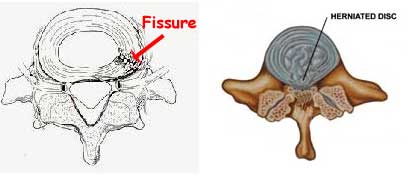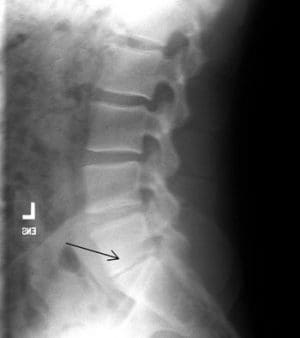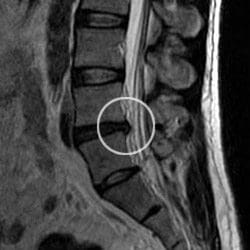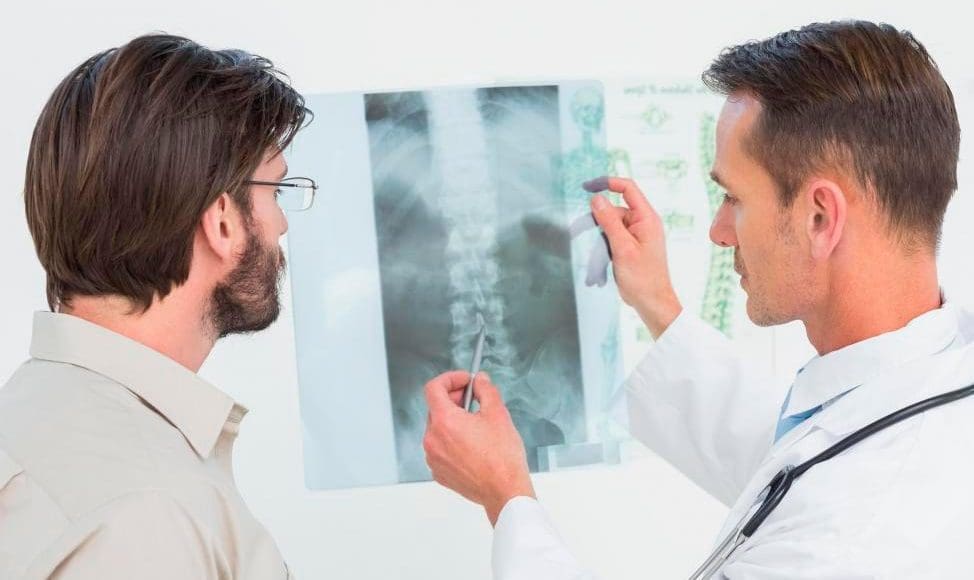A shooting, stabbing pain that travels from your back or buttocks, into the thighs, legs and foot is called sciatica or radiculopathy. It can be associated with weakness or numbness in your foot and leg.
The most frequent cause of the condition is a ruptured disk (also called a herniated disc or bulging disc) in the lower spine. In this report, we  will examine disk problems of the lower back, also known as lumbar disc disease.
Table of Contents
Anatomy of the Lumbar Spine
The lumbar spine is made up of the last five vertebrae of the backbone. The vertebrae are the bones of your spine. Their role is to give protection and support to the body and particularly the spinal cord.
The facet joints enable the vertebrae to be connected. They provide connections between each vertebra.
An intervertebral disc sits between each vertebra. The annulus fibrosus is the outer ring and will be the disc’s strongest aspect. It is responsible for connecting the vertebrae. The nucleus pulposus is the soft part of the disc. This material is accountable for its shock absorption properties and it has about the consistency of crab meat.
The nerve roots of the spine carry signals involving the lower extremities and the brain that enable us to move our legs (motor function) and perceive sensations such as touch, temperature, and pain (sensory function).
To better understand how each other is affected by the parts of the spine, we must first focus on a spinal segment. A spinal segment is made up of the intervertebral disk between 2 vertebra, and both nerve roots that depart from that spinal degree, one from each side.

The discs have cartilaginous endplates at bottom and the top and are surrounded by the annulus. During degeneration or injury, the fibrous tissue (annulus fibrosus) constraining the soft disc material (nucleus pulposus) can tear. This may result in bulging (protrusion) of this disk or even extrusion of disc material into the spinal canal or neural foramen. This condition becomes what is best known as a prolapsed disc, ruptured disc or herniated disc.
Lumbar Herniated Discs
Among one of the most common problems of the lower spinal column are herniated discs. In this state, a tear in an annulus fibrosus enables the nucleus pulposus to squeeze into the spinal cord canal.


When a nerve root is compressed by the disk material, there can be pain, numbness, and fatigue in the areas supplied by the nerve (often down the rear of a leg). It is not strange for the back itself to painless. Thus, a herniated lumbar disc characteristically produces leg and buttock pain but not back pain. This pain is termed sciatica or radiculopathy.
Numbness will often lead after the function of the nerve root is impaired due to compression. The subject of numbness is determined by the root, and might be in the ankle, the heel, the big toe, the outer leg, or a combination of these. Impairment of motor function of this origin will lead to weakness, and that depends on the special root.
| Disc Level | Â Root Comp. | Â Weakness | Â Reflex Involvement | Â Sensory Loss | Â Pain Distribution |
| Â L3-L4 | Â L4 | Â quadriceps, tibialis anterior | Â knee jerk | medial knee and shin | Â anterior thigh |
| Â L4-L5 | Â L5 | Â extension of big toe | Â no significant | Â big toe | Â back of thigh, lateral calf |
| L5-S1 | Â S1 | Â gastrocnemius (ankle plantar flexion) | Â Achilles | Â lateral foot and heel | Â back of thigh and calf |
In herniated disks, the L5-S1 intervertebral disc is involved 45 to 50 percent of the time, L3-L4 about 5 percent, and L4-L5 about 40 to 45 percent. Disc herniation at the opposite lumbar levels is uncommon.
The nerve root that has been compacted is the one exiting the level below the disk in the majority of cases.
But if the herniation is lateral (on the side of the intervertebral disk, as opposed to a central disk herniation in the center of the disk), then the root compacted will be the one departing over. This is known as a far lateral disc herniation and occurs in about 3 percent to 10 percent of instances.
It’s also important to be aware that while the indications outlined in Table 1 (see above) are helpful in the identification and decision making regarding kind of treatment, not all of the symptoms and signs associated with a root might be present in a person, and multiple origin signs may even be present.
The scope of our information is limited to chiropractic and spinal injuries and conditions. To discuss options on the subject matter, please feel free to ask Dr. Jimenez or contact us at 915-850-0900 . 
By Dr. Alex Jimenez
Additional Topics: Sciatica
Lower back pain is one of the most commonly reported symptoms among the general population. Sciatica, is well-known group of symptoms, including lower back pain, numbness and tingling sensations, which often describe the source of an individual’s lumbar spine issues. Sciatica can be due to a variety of injuries and/or conditions, such as spinal misalignment, or subluxation, disc herniation and even spinal degeneration.
<
div class=”video-container”>
<
iframe src=”https://www.waxwinginteractive.com/manage/admin/playembed.php?vid=5&client=1350 scrolling=”no” border-width=”0″>

TRENDING TOPIC: EXTRA EXTRA: New PUSH 24/7Â®ï¸ Fitness Center
Post Disclaimer
Professional Scope of Practice *
The information herein on "Low Back Issues: Lumbar Herniated Discs | El Paso Spine Scientist" is not intended to replace a one-on-one relationship with a qualified health care professional or licensed physician and is not medical advice. We encourage you to make healthcare decisions based on your research and partnership with a qualified healthcare professional.
Blog Information & Scope Discussions
Welcome to El Paso's Premier Wellness, Personal Injury Care Clinic & Wellness Blog, where Dr. Alex Jimenez, DC, FNP-C, a Multi-State board-certified Family Practice Nurse Practitioner (FNP-BC) and Chiropractor (DC), presents insights on how our multidisciplinary team is dedicated to holistic healing and personalized care. Our practice aligns with evidence-based treatment protocols inspired by integrative medicine principles, similar to those on this site and our family practice-based chiromed.com site, and focuses on restoring health naturally for patients of all ages.
Our areas of multidisciplinary practice include Wellness & Nutrition, Chronic Pain, Personal Injury, Auto Accident Care, Work Injuries, Back Injury, Low Back Pain, Neck Pain, Migraine Headaches, Sports Injuries, Severe Sciatica, Scoliosis, Complex Herniated Discs, Fibromyalgia, Chronic Pain, Complex Injuries, Stress Management, Functional Medicine Treatments, and in-scope care protocols.
Our information scope is multidisciplinary, focusing on musculoskeletal and physical medicine, wellness, contributing etiological viscerosomatic disturbances within clinical presentations, associated somato-visceral reflex clinical dynamics, subluxation complexes, sensitive health issues, and functional medicine articles, topics, and discussions.
We provide and present clinical collaboration with specialists from various disciplines. Each specialist is governed by their professional scope of practice and their jurisdiction of licensure. We use functional health & wellness protocols to treat and support care for musculoskeletal injuries or disorders.
Our videos, posts, topics, and insights address clinical matters and issues that are directly or indirectly related to our clinical scope of practice.
Our office has made a reasonable effort to provide supportive citations and has identified relevant research studies that support our posts. We provide copies of supporting research studies upon request to regulatory boards and the public.
We understand that we cover matters that require an additional explanation of how they may assist in a particular care plan or treatment protocol; therefore, to discuss the subject matter above further, please feel free to ask Dr. Alex Jimenez, DC, APRN, FNP-BC, or contact us at 915-850-0900.
We are here to help you and your family.
Blessings
Dr. Alex Jimenez DC, MSACP, APRN, FNP-BC*, CCST, IFMCP, CFMP, ATN
email: [email protected]
Multidisciplinary Licensing & Board Certifications:
Licensed as a Doctor of Chiropractic (DC) in Texas & New Mexico*
Texas DC License #: TX5807, Verified: TX5807
New Mexico DC License #: NM-DC2182, Verified: NM-DC2182
Multi-State Advanced Practice Registered Nurse (APRN*) in Texas & Multi-States
Multi-state Compact APRN License by Endorsement (42 States)
Texas APRN License #: 1191402, Verified: 1191402 *
Florida APRN License #: 11043890, Verified: APRN11043890 *
Colorado License #: C-APN.0105610-C-NP, Verified: C-APN.0105610-C-NP
New York License #: N25929, Verified N25929
License Verification Link: Nursys License Verifier
* Prescriptive Authority Authorized
ANCC FNP-BC: Board Certified Nurse Practitioner*
Compact Status: Multi-State License: Authorized to Practice in 40 States*
Graduate with Honors: ICHS: MSN-FNP (Family Nurse Practitioner Program)
Degree Granted. Master's in Family Practice MSN Diploma (Cum Laude)
Dr. Alex Jimenez, DC, APRN, FNP-BC*, CFMP, IFMCP, ATN, CCST
My Digital Business Card
Licenses and Board Certifications:
DC: Doctor of Chiropractic
APRNP: Advanced Practice Registered Nurse
FNP-BC: Family Practice Specialization (Multi-State Board Certified)
RN: Registered Nurse (Multi-State Compact License)
CFMP: Certified Functional Medicine Provider
MSN-FNP: Master of Science in Family Practice Medicine
MSACP: Master of Science in Advanced Clinical Practice
IFMCP: Institute of Functional Medicine
CCST: Certified Chiropractic Spinal Trauma
ATN: Advanced Translational Neutrogenomics
Memberships & Associations:
TCA: Texas Chiropractic Association: Member ID: 104311
AANP: American Association of Nurse Practitioners: Member ID: 2198960
ANA: American Nurse Association: Member ID: 06458222 (District TX01)
TNA: Texas Nurse Association: Member ID: 06458222
NPI: 1205907805
| Primary Taxonomy | Selected Taxonomy | State | License Number |
|---|---|---|---|
| No | 111N00000X - Chiropractor | NM | DC2182 |
| Yes | 111N00000X - Chiropractor | TX | DC5807 |
| Yes | 363LF0000X - Nurse Practitioner - Family | TX | 1191402 |
| Yes | 363LF0000X - Nurse Practitioner - Family | FL | 11043890 |
| Yes | 363LF0000X - Nurse Practitioner - Family | CO | C-APN.0105610-C-NP |
| Yes | 363LF0000X - Nurse Practitioner - Family | NY | N25929 |
Dr. Alex Jimenez, DC, APRN, FNP-BC*, CFMP, IFMCP, ATN, CCST
My Digital Business Card





 Again, We Welcome You.
Again, We Welcome You.
Comments are closed.